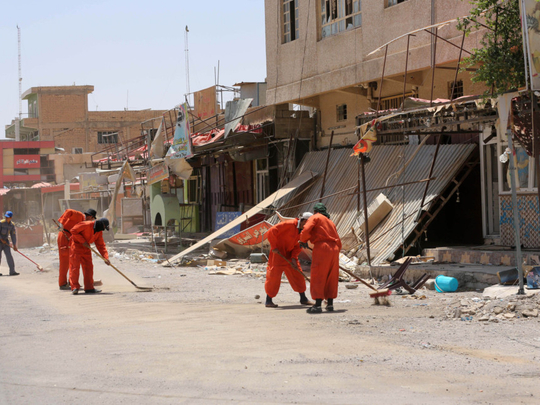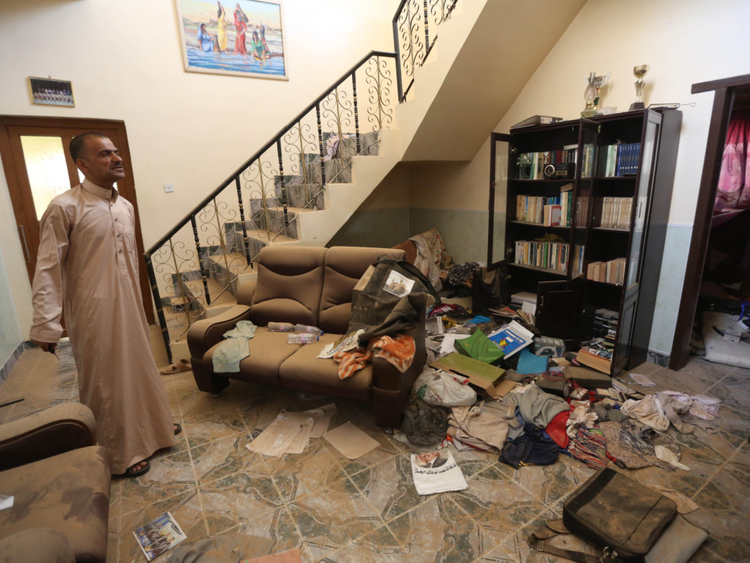
Baghdad, Istanbul: When Umm Ahmad returned to her Iraqi hometown, Tikrit, in recent days she found a city devastated by fighting with terrorists from Daesh: buildings burnt, shops looted, schools shuttered and hospitals inoperable.
Still, it was home, and it was good to be back.
“Today, I am in the middle of Tikrit,” Umm Ahmad, 39, said last week, preferring to be identified by her honorific. “I never believed I would go back home. I am so happy and I cannot describe my feelings, and my tears of joy haven’t stopped, because of my return home.”
More than two months ago, Daesh was driven from Tikrit, the hometown of Saddam Hussain and the largest city the terrorist group has lost in either Iraq or Syria. It was defeated by a combination of US air strikes, Iraqi forces and Shiite militias, some led by Iran.
Displaced families began returning last week in a crucial test of the central government’s ability to stabilise newly liberated areas without aggravating sectarian tensions that Daesh was able to exploit last year when it seized territories across the north and west of Iraq.
Baghdad, so far at least, has passed that test, providing a small glimmer of sectarian reconciliation that could provide a template for stabilising other cities, such as Mosul, if Daesh can be driven out of there.
Prime Minister Haider Al Abadi came to power pledging to mend the sectarian fissures that were opened under his predecessor, Nouri Al Maliki. The reluctance of alienated Sunni soldiers to fight on behalf of the government has been cited as a major reason Daesh has so easily conquered large cities in Sunni areas of the country, most recently Ramadi.
Rebuilding Sunni Arabs’ trust in the central government will not be done overnight or in any grand gesture, analysts say. It will be achieved in small steps, like the peaceful resettlement of families of Tikrit — themselves only a tiny sliver of the nearly three million Iraqis who have been chased from their homes by fighting with Daesh, according to the United Nations.
The first families to return last week, from Kurdish areas in the north and near Kirkuk, rode in on buses escorted by Shiite militias. That, itself, was significant, as many residents had well-founded fears of becoming the victims of revenge killings by militias that suspected them of supporting Daesh.
The government has opened bakeries and shops in Tikrit and provided residents with six months’ worth of provisions, such as rice and cooking oil. Crucially, local Sunni forces — former police officers and Sunnis who joined militias — are providing security within the city.
‘Positive development’
Helping residents return to their homes, providing food and restoring essential services to devastated areas like Tikrit, analysts say, is equally important to the long-term stability of Iraq as military operations to confront Daesh.
“It’s definitely a positive development,” said Zaid Al Ali, an Iraqi analyst who has been in contact with Tikrit residents. “The larger perspective is it’s good for sectarian relations in Iraq. Sunnis are able to go home; Sunnis who were once accused of supporting Daesh,” he continued.
Ali, an analyst and author of The Struggle for Iraq’s Future, an indictment of Iraq after the US withdrawal, said that Baghdad’s handling of displaced Sunnis was vitally important to the broader strategy of defeating Daesh.
So far, he said, the return of residents to Tikrit is “a big blow to Daesh’ narrative that they defend Sunnis from Baghdad.” If the repopulation of Tikrit goes well, he said, it could turn local populations against Daesh in places like Mosul, to the north, and Anbar province, to the west, where the group is entrenched and enjoys some support from locals. That could prove decisive in any military action against Daesh in those areas.
“A successful return of residents and restoration of services could represent a turning point in the fight against Daesh nationwide,” Kirk Sowell, the publisher of the newsletter Inside Iraqi Politics, wrote of Tikrit. It would, however, “require careful cooperation between Shiite militias and Baghdad-allied Sunni tribes.”
In March, when Shiite militias began to liberate Tikrit, many feared a sectarian bloodbath to avenge the slaughter last summer of nearly 1,700 Shiite military personnel who had been stationed in nearby Camp Speicher, the greatest single atrocity committed by Daesh.
Those fears were largely unfounded, partly because the Shiite militias have become more professional since 2006 and 2007, when they were blamed for sectarian atrocities. Nowadays, they are seen as protectors of Iraq, and they enjoy widespread popularity among the Shiite public. Militia leaders, meanwhile, have urged restraint on their fighters because they hope to transform the militias’ newfound popularity into political power if Daesh can be defeated.
While there was extensive looting in Tikrit, there were no mass revenge killings. Bad behaviour by the Shiite militias was, according to Ali, “nowhere near to the extent that had been expected.”
Still, while the resettling of the first batch of families has gone reasonably well, challenges remain. Only about 1,000 families, a small portion of Tikrit’s population, have returned so far, according to a local official.
Electricity in Tikrit is still scarce; generators are running, but the city has not been reconnected to the national grid. And the central government, facing a severe budget crisis because of the decline in the price of oil and the cost of the war against Daesh, is too short of cash to fund any major reconstruction.
Fears about sectarian violence have given way to worries about conflicts between pro-government tribes and tribes perceived to have been supporters of Daesh.
Recently tribal leaders in the area, along with a representative from the Shiite religious establishment in Najaf, held a meeting on tribal reconciliation. Hadi Al Ameri, the leader of the Badr Organisation, a long-standing Shiite militia that is supported by Iran, also met with the local tribes.
“It was a very fruitful meeting,” said Shaikh Kareem Al Nida, a leader of the Al Bu Ajeel tribe, some of whose members are believed to have supported Daesh. “All the tribes agreed to hand over all Daesh collaborators from our tribes.”
Then there is the residue of resentment among residents who say they waited too long to be afforded the right to return. For more than two months they waited in refugee settlements, they said, without word from the government on what their future would be.
‘Dream’
They heard rumours that the militias had destroyed their homes, or that they would be forever banished from their hometown and that the families of Camp Speicher victims would be resettled there.
Many said they were worried about being falsely accused of supporting Daesh. At the entrance to Tikrit, militiamen check names against a computer database filled with supposed Daesh collaborators.
“There are no guarantees to protect me and my family,” said Mohammad Sultan, a Tikrit resident who fled to the Kurdish-controlled north of Iraq. “The road to Tikrit is filled with security computers looking for the wanted. I don’t know if my name is listed. I’m afraid I will be arrested for no reason.”
Others who had returned said their fears had not materialised.
“There had been concerns about returning to Tikrit,” said Ayad Al Hani, who left Tikrit last year and returned last week. “Especially after the allegations of destroying, burning and the violations by a few bad fighters. But the picture is different now.
“I couldn’t believe my eyes when I was getting closer to Tikrit,” he added. “I thought it was a dream.”












